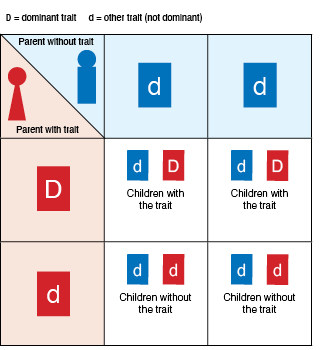Autosomal Dominant Inheritance
Genes are the blueprints for making proteins. Our bodies need proteins to develop and work correctly. Most genes come in pairs. One is inherited from the mother and the other from the father. Genes inherited from our biological parents are expressed in specific ways. One of these basic patterns is called autosomal dominant inheritance.
What is autosomal dominant inheritance?
There are 2 types of chromosomes:
-
Sex chromosomes, which determines male or female sex
-
Autosomes, which are all of the other chromosomes (chromosome pairs 1 through 22)
Autosomal inheritance of a gene means that the gene is located on one of the autosomes. This means that males and females are equally likely to inherit the gene. "Dominant" means that a single copy of the gene can cause a particular trait, such as brown eyes instead of blue eyes. When a parent has a dominant gene, there is at least a 50% chance that any child they have will also have the trait.
There are 4 possible combinations in the children (see figure). These combinations are possible every time a pregnancy occurs between these 2 individuals. The gender of the children (whether they are sons or daughters) does not matter. The chance is 50/50 for them to inherit the autosomal genes.

A characteristic of some dominant genes is that they can have variable expression. This means that some people have milder or more intense characteristics than others. Another important characteristic of dominant genes is that, in some cases, they can have reduced penetrance. This means that sometimes a person can have a dominant gene copy but not show any signs of the gene. The concept of reduced penetrance is particularly important in the case of autosomal dominant cancer susceptibility genes. If a person has inherited a cancer susceptibility gene, it does not mean they will automatically develop cancer. It simply means that the person has inherited a mutation in a gene that gives them a higher chance to develop cancer than someone without the mutation.
Examples of conditions involving autosomal dominant inheritance are:
-
Marfan syndrome
-
Neurofibromatosis
-
Achondroplasia